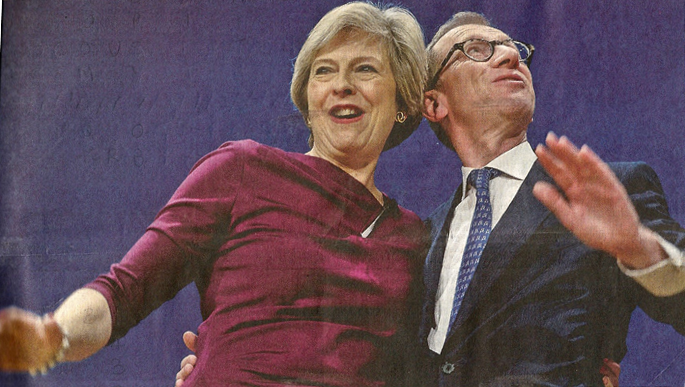The end of the Tory Party conference has prompted me to ponder what kind of PM Theresa May will be, and hence what kind of government we now have.
Tory Women
It seems to me the Tories have always had some unease working out what to think of their women with power. (I suspect it’s because so many of them went to single-sex or boarding schools. Certainly the Cameroons seemed quite uncomfortable around women.) The traditional role of the loyal Tory wife (tea and sandwiches) won’t do. Instead, there’s the school matron dominatrix type (à la Thatcher) and the totally vacuous (Leadsom and Dorries are the obvious names that spring to mind). But now there also seems to be the mother hen, offering soothing comfort and a sense of stability.

On her recent performance, May seems to be pitching herself as a hybrid of the mother hen and the dominatrix: a weird mix! The slogan “A country that works for everyone” was plastered everywhere. It’s a soothing, comfort blanket of a phrase, utterly devoid of meaning: so a bit of vacuous with the mother hen, then. May had channelled her inner Thatcher before the conference: “Remind you of everyone?” at her maiden PMQ. This time, she accused Labour of being “the Nasty Party”. Good for a quick laugh from the faithful, but bad strategically. The delivery is laboured (no pun intended), clunky and it sounds bullying: nasty, in fact.
So it all means that she hasn’t yet settled on a tone for her premiership. The submarine remains partially submerged from view.
Mayism?
Yes, I know: a new, crap “ism” word. So, what can we deduce from the clearly signalled change of direction for the government? It’s a change for which, of course, she has no electoral mandate. We merely (MERELY??) had a yes/no referendum which asked one question (membership of EU) and which has been selectively spun to mean another (control immigration).
Let’s start with the good news. The single most welcome comment in May’s speech was the recognition of “the good that government can do”. This is a clear break from the small state Conservatism since Thatcher. Workers’ representation on company boards (the law for decades in Germany) and attacks on boardroom excessive pay and company tax avoidance are a straight steal from the Miliband songbook. These are to be welcomed – if she means it. The proof will be in what her government actually does on these matters. I’m highly sceptical.
But there’s plenty of bad news, some of it downright sinister. As Home Secretary, May always showed a very illiberal streak. Her “snoopers’ charter” and dislike of the whole human rights agenda is deeply troubling. Those in her sights include the “household name that refuses to work with the authorities even to fight terrorism”. The tone and message of that section of her speech sounded more like that of a Mussolini, Erdogan or Assad than that of the leader of a free country.
The other dangerous area of policy is in how she framed the break from the post-Thatcher orthodoxy of excessive individualism and self-interest. Her criticism of the “elite” deliberately conflates two very distinct groups. The first is designed to appeal to Labour and left-leaning voters: the greedy, selfish extremely rich 1% who have seen their wealth double since the 2008 crash. The second group is millions of socially progressive middle class people who are both socially liberal and who welcome the openness and multiculturalism of modern Britain. By this fudge, I fear she aims to pander to the intolerance and xenophobia of so-called “middle England”.
Small Island
I call this approach small-mindedness and an appeal to humans’ tribalism. I concede there is something socially useful in the idea of a community at a very local level: neighbours working together and collaborating for the common good. But May’s version is, deliberately, broader and vaguer than this. Expect the “tribe” to be defined by May in a multiplicity of ways: the street, the football team, the village, the small town, the country – but certainly never wider than the country. The left’s traditional internationalism is anathema to this world view. When it gets really sinister is when the “small-mindedness” world view gets applied to race or religion. We’ve seen more than enough of a rise in hate crime, xenophobia and bigotry since 23rd June. Under May’s leadership, expect more.